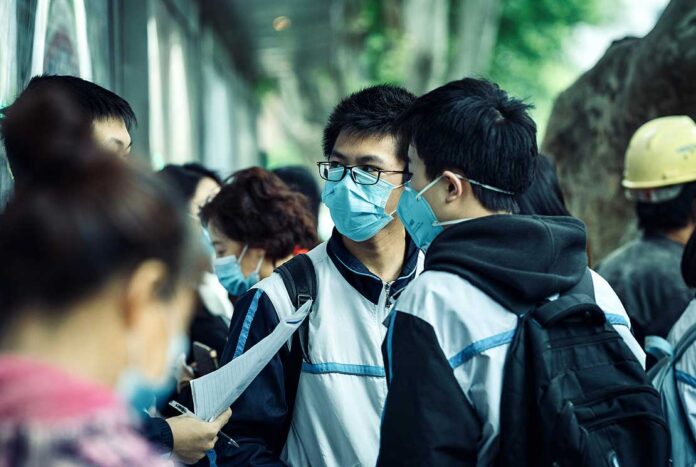Source: Massey University
Perceptions about China and the pandemic played a part in Asian New Zealanders’ experiences of discrimination according to new research (photo:Li Lin/Unsplash)
Research on the impact of COVID-19 on New Zealand’s diverse communities is the focus of the event, titled Social response to COVID-19 in New Zealand: Obligations and stigmatisation, coordinated by senior lecturer at the School of Humanities Dr Liangni Sally Liu and Director of the Joint Centre for Disaster Research Professor David Johnston. Dr Liu was awarded $350,325 in 2020 from the Health Research Council’s (HRC) Emerging Infectious Disease Grant for a two-year study to investigate social responses to COVID-19 in New Zealand.
The research team members are from diverse disciplines: social science, social work, epidemiology, psychology, statistics, and media studies. Their research has focussed on how individuals and institutions have perceived and responded to the pandemic threat.
Preliminary findings from Dr Liu’s research reveal just under a quarter of Asian New Zealanders surveyed said they experienced pandemic-related discrimination. She found that Chinese Asians in particular reported a sense of being discriminated against. This was in the context of the global disease spread in which Chinese or Chinese-looking people were a scapegoat for other countries’ failure to contain the virus (which originated in Wuhan, China), says Dr Liu.
Another research prestentation looks at in-depth interviews with guests of New Zealand’s MIQ (managed isolation and quarantine) system, who praised the humanistic approach, “including the empathetic language and attitudes applied by MIQ frontline workers, the exercise and outdoor opportunities allowed during the stay, and mental health interventions provided.”
Researchers will present preliminary findings of their COVID-19-related investigations, which focus on social, cultural and political issues, experiences and activities. Other topics explored include Asian people’s risk perception and knowledge of COVID-19, self-protection practices, mental health during the pandemic, and opinions on the effectiveness of the New Zealand government’s measures to contain the virus.
“The reason for having a focus on these issues is because we believe that the COVID-19 pandemic is not just public health crisis, it can also inform different and intersecting areas of cultural perceptions, medical discourses, racial relations, and regional and international health governance,” says Dr Liu.
The symposium will be held on August 26 to 27. Some of the presentation topics include:
-
Asian experiences of racial discrimination and stigmatisation during the pandemic in Aotearoa/New Zealand – Dr Liangni Sally Liu (Massey University)
-
Supporting community recovery: COVID-19 and beyond – Professor David Johnston, Carol MacDonald and Maureen Mooney (Joint Centre for Disaster Research – Massey University)
-
New Zealand media’s response to the COVID-19 pandemic: A quantitative content analysis of the pandemic-related news headlines in New Zealand Herald – Xiaoting Liu and Dr Liangni Sally Liu (Massey University)
-
Facebook users responses to the news coverage of COVID-19 in the New Zealand Herald – Dr Yuan Gong (Massey University)
-
Asian people’s knowledge of COVID-19, risk perceptions, self-protection practices and opinions towards the government measures – Xiaoyuan Sophia Jia (Massey University), Dr Andrew Zhu (Trace Research) and Dr Liangni Sally Liu (Massey University)
-
Examining mood among the online survey of Asian respondents living in Aotearoa/New Zealand in 2020 – Professor Richard Siegert (Auckland University of Technology)
-
Understanding the Managed Isolation and Quarantine system in Aotearoa/New Zealand under the COVID-19 pandemic: A guest perspective – Dr Guanyu Jason Ran (Waikato Institute of Technology) and Dr Liangni Sally Liu (Massey University)
Other topics include midwifery and maternity care during lockdown, the experiences of people needing care for strokes, and isolation of people with disabilities.
Dr Liu says the symposium is an opportunity to bring together researchers from other tertiary institutions who share similar interests. Also attending are the Director of Health Services, Managed Isolation and Quarantine Tess Ahern, and Gloria Gao, from Chinese New Settlers Services Trust Foundation.
“Through sharing and discussion, the ultimate goal of the symposium is to better understand New Zealand’s responses to the pandemic and provide practical advice to support wellbeing during and in the wake of the pandemic,” says Dr Liu. “We also realise that understanding various experiences and responses from different communities and organisations is vital to facilitate post-pandemic recovery, support services, enhance social environment, improve policy implementation, and thereby contribute to a more resilient and sustainable community.”
Team members include Principal Investigator Dr Liangni Sally Liu (Massey University) and co-investigators; Professor David Johnston, Distinguished Professor Nigel French and Dr Yuan Gong (all from Massey); Professor Richard Siegert (AUT) and Dr Guanyu Jason Ran (Wintec) as well as an external advisor – Dr Andrew Zhu (Trace Research).
For more information on the symposium, click here, or contact Dr Liangni Sally Liu (l.liu2@massey.ac.nz).



